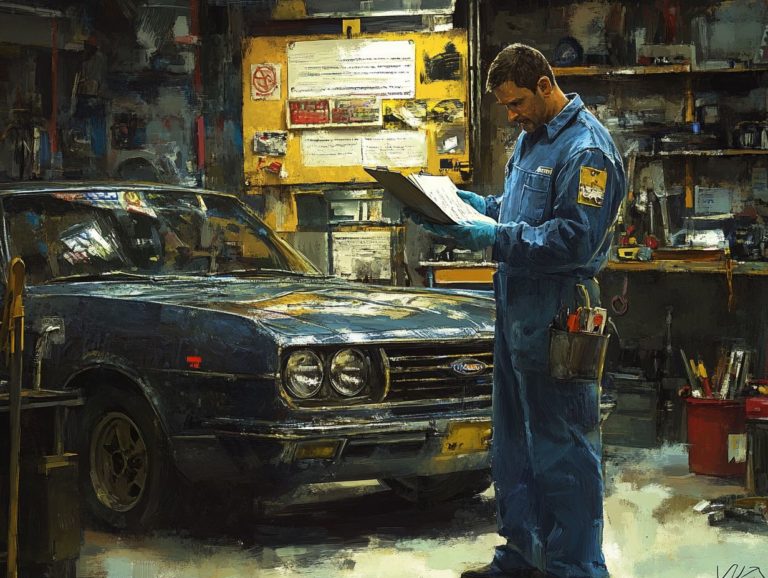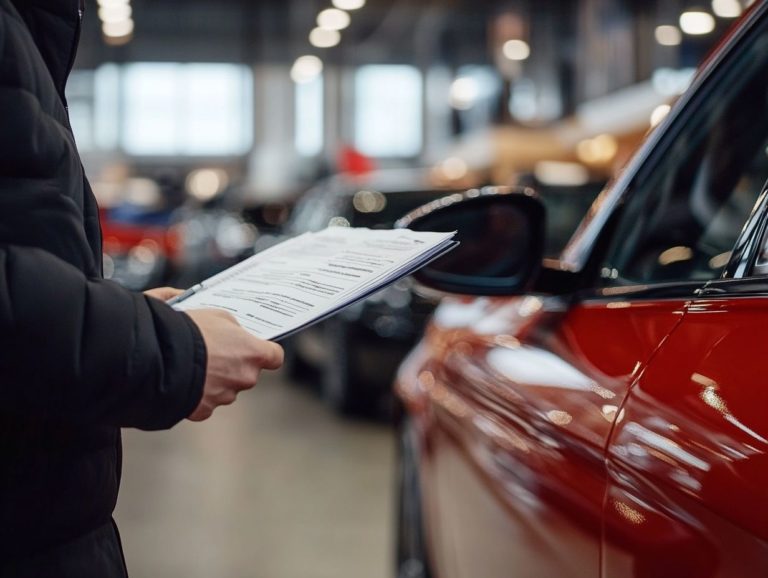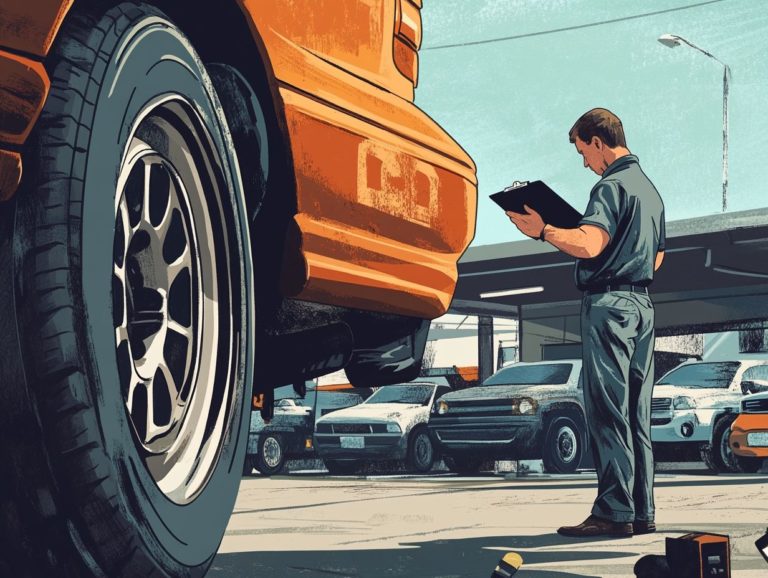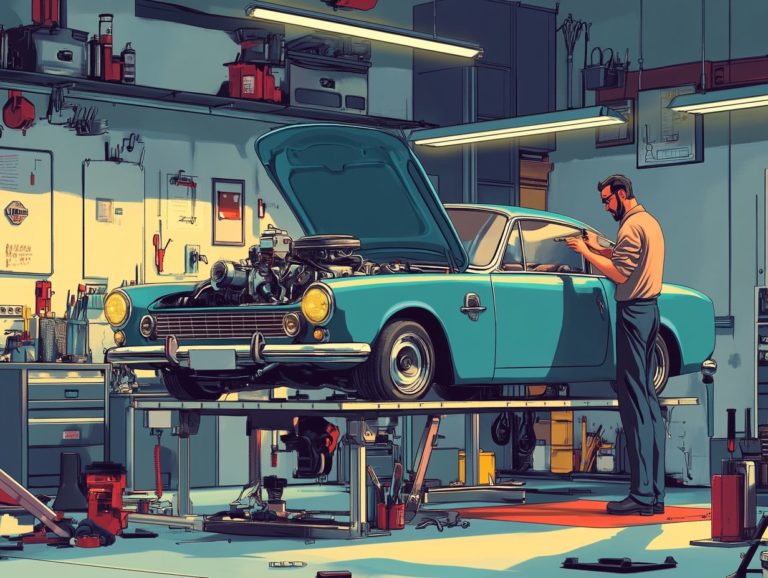5 Red Flags When Buying a Used Car
Purchasing a used car can be thrilling and intimidating. With so many options available, not every deal is as good as it seems.
This article highlights five red flags to watch for when buying a used car ranging from prices that seem too good to be true to a seller s reluctance to share maintenance records.
It discusses the advantages of buying used, weighs the pros and cons of dealerships versus private sellers, and offers valuable tips to avoid scams. Continue reading to gather crucial insights that could save you money!
Contents
- Key Takeaways:
- 1. The Car Has a Suspiciously Low Price
- 2. The Seller Is Not Willing to Provide Maintenance Records
- 3. The Car Has a History of Accidents or Damage
- 4. The Seller Is Not Willing to Let You Test Drive the Car
- 5. The Car Has a High Mileage for Its Age
- What Are the Benefits of Buying a Used Car?
- What Are the Advantages of Buying from a Dealership vs. a Private Seller?
- What Are the Key Factors to Consider When Buying a Used Car?
- How Can You Avoid Being Scammed When Buying a Used Car?
- What Are the Most Reliable Brands for Used Cars?
- What Are the Most Common Red Flags to Look Out for When Buying a Used Car?
- Preguntas Frecuentes
- Cu les son las se ales de advertencia m s comunes al comprar un coche de segunda mano?
- Por qu es una se al de advertencia el alto kilometraje al comprar un coche de segunda mano?
- C mo puedo saber si un coche ha estado en un accidente?
- Por qu es importante revisar los registros de mantenimiento de un coche de segunda mano?
- Qu debo hacer si noto olores o ruidos extra os al probar un coche de segunda mano?
- Por qu deber as estar alerta con modificaciones extra as en un coche usado?
Key Takeaways:
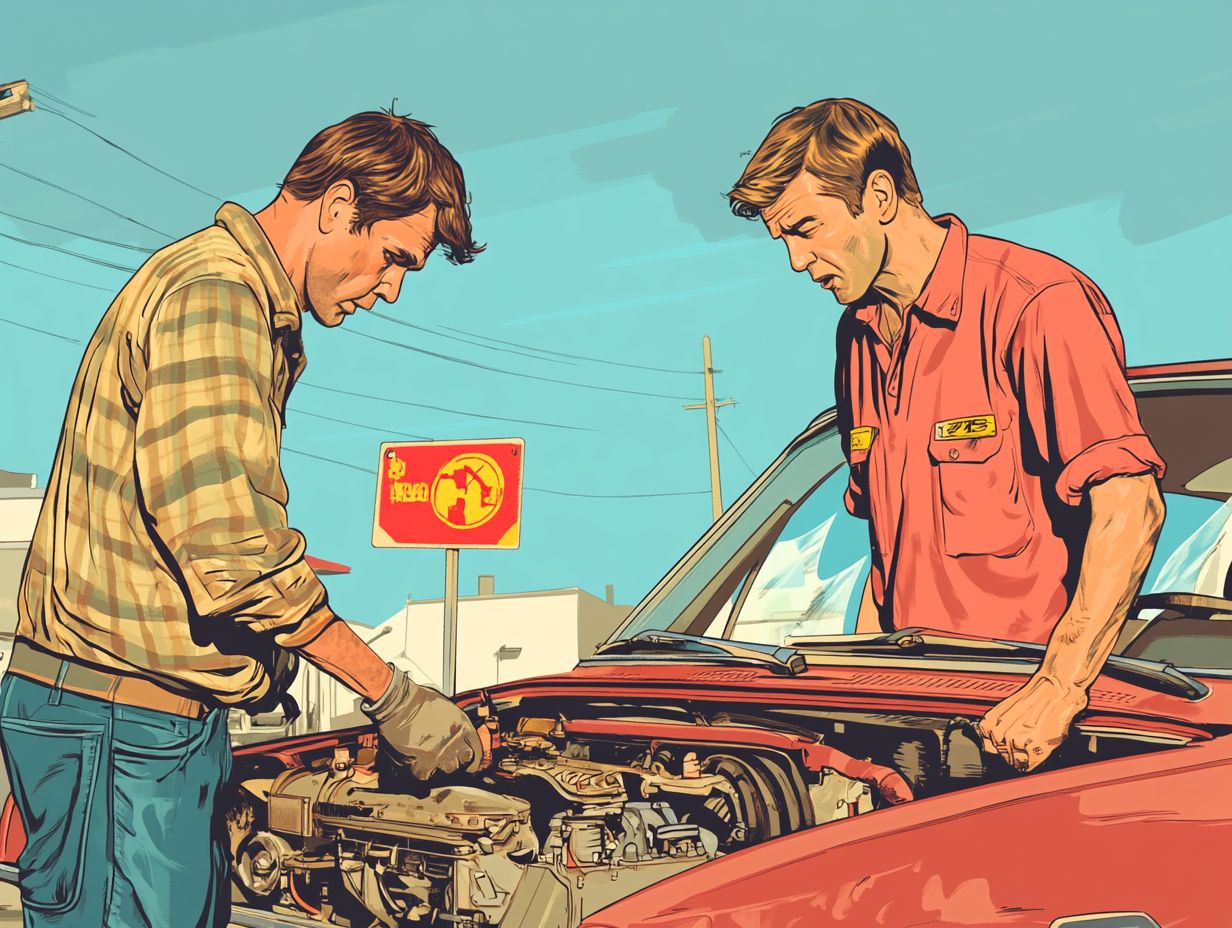
Be wary of a used car with a suspiciously low price; it could signal underlying issues or scams.
If the seller won t provide maintenance records, it s best to avoid the car, as this may indicate neglect.
Always check the car’s history for any accidents or damage before making a purchase, as these could lead to costly repairs down the line.
1. The Car Has a Suspiciously Low Price
An unusually low price should raise red flags when considering a used car, as it often indicates hidden issues that could affect the vehicle’s value and reliability. To make an informed decision, be sure to review the top mistakes to avoid when buying used cars.
Investigate why the seller has set such a low price; it might hint at problems that aren t immediately visible.
Common issues could include problems with the car s ownership records, past accidents, or mechanical issues.
For example, a seller may want to sell a car that has sustained significant damage from a collision, or the vehicle might have undisclosed engine troubles. Such issues can turn what seems like a fantastic deal into a financial headache.
This is where obtaining a detailed vehicle history report like those from CARFAX comes into play. These reports provide valuable insights into previous ownership, accident history, and service records.
With this information, you can make informed decisions and avoid unexpected pitfalls on your car-buying journey.
2. The Seller Is Not Willing to Provide Maintenance Records
Lack of maintenance records from the seller is a glaring red flag when looking for a used car. To ensure a smart purchase, it’s essential to know what to avoid in a used car deal, as these documents are crucial for assessing the vehicle’s history and overall condition.
Without clear evidence of regular maintenance, you risk unexpected mechanical issues, which could lead to costly repairs. This raises concerns about potential neglect and the car’s reliability.
Analyzing maintenance records offers insights into previous repairs and routine services performed like oil changes and brake replacements. Understanding how the vehicle has been cared for provides a glimpse into its current state and past ownership.
Access to this information can be pivotal during a pre-purchase inspection, enabling informed decisions and avoiding investments in cars with hidden issues.
3. The Car Has a History of Accidents or Damage
The vehicle’s history of accidents or damage can be a significant concern when buying a used car. To navigate these issues effectively, consider following 5 tips for buying used cars from private sellers, as this often leads to vulnerabilities that impact safety and performance.
Understanding the extent of any past damage whether from collisions or floods is crucial for making a well-informed decision.
A thorough examination of the vehicle’s history can reveal important insights that may not be visible during a casual inspection.
By obtaining a comprehensive vehicle history report, you can uncover critical details about prior accidents, insurance claims, and any flood damage. This report offers vital information that greatly influences the vehicle’s overall value and reliability.
Agencies like the National Insurance Crime Bureau provide resources that help verify the car’s history and identify potential red flags. Such diligence can save you from unexpected repair costs and ensure you select a vehicle that meets your expectations.
Start your search today to find the perfect used car!
4. The Seller Is Not Willing to Let You Test Drive the Car
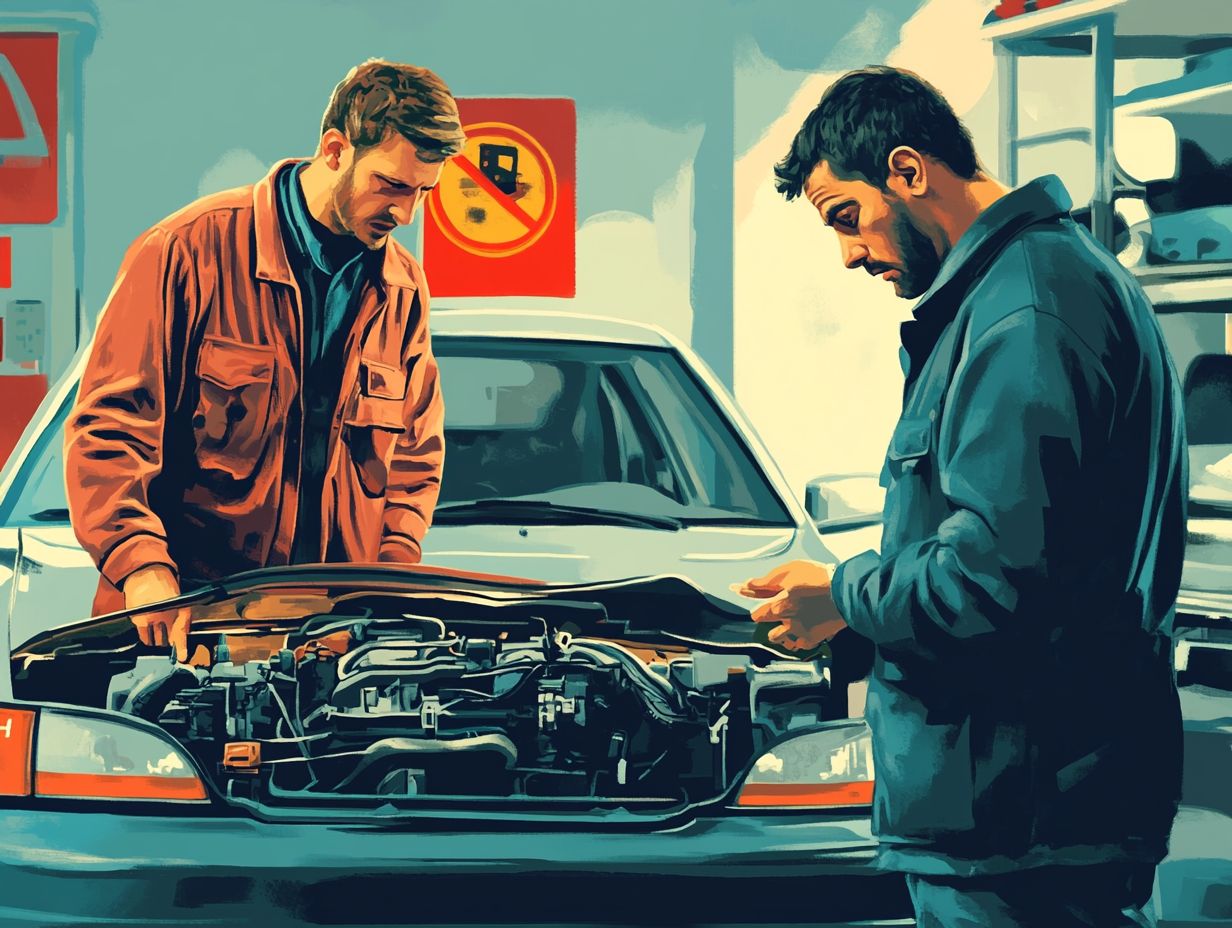
A seller’s refusal to allow a test drive of a used car is a clear warning sign that you should never ignore. This simple step is essential for evaluating how well the car works. To ensure a safe purchase, it’s important to be aware of how to avoid scams when buying used cars. A test drive reveals potential issues, such as strange noises from the engine or odd sounds from the suspension, which could indicate deeper problems.
During your test drive, you can assess vital aspects like comfort and handling. These factors significantly impact your overall driving experience. It s during these moments behind the wheel that you can feel how the vehicle reacts to acceleration, braking, and turns. This insight is something a static inspection simply cannot provide.
Pay close attention to the comfort of the seat, the ease of the controls, and how the car performs on various terrains. Experiencing the vehicle firsthand is invaluable, ensuring it meets your needs and expectations. This ultimately helps you make a well-informed purchasing decision.
5. The Car Has a High Mileage for Its Age
High mileage on a used car can be concerning, especially for its age. It often signals increased wear and tear that could lead to future headaches.
A vehicle with significantly high mileage usually requires more frequent maintenance. It may also come with a hefty price tag due to upcoming repair needs. Always examine the car’s maintenance records to avoid surprises!
This high mileage doesn t just affect the car’s immediate reliability; it can also impact its resale value if you decide to sell. However, if the vehicle has a documented history of regular servicing and timely repairs, it may still have a good lifespan ahead.
Conducting a thorough assessment, perhaps including a pre-purchase inspection, allows you to evaluate the overall condition of the vehicle. This diligence is essential for ensuring your decision is well-informed, helping you balance the initial purchase price with potential future maintenance and repair investments.
What Are the Benefits of Buying a Used Car?
Buying a used car offers you numerous advantages, providing significant cost savings over new vehicles while expanding your choices and potentially lowering your insurance rates. The rapid depreciation of new cars often results in more appealing prices for used models, making them a great option for budget-conscious buyers.
Many used cars still come with extended warranties and often have detailed maintenance records. These records give you peace of mind about their condition.
Choosing a used vehicle can also lower your insurance premiums, reducing your overall ownership costs over time. Conducting thorough vehicle inspections before making a purchase can reveal potential issues that might otherwise slip under the radar, ensuring a sound investment.
Accessing comprehensive maintenance histories can enhance your decision-making process. These records provide valuable insights into how well the vehicle has been maintained, contributing to its longevity and reliability.
With reduced depreciation rates, opting for a used car is not only financially savvy but can also yield benefits for years to come. Don t miss out on the chance to drive your perfect car!
What Are the Advantages of Buying from a Dealership vs. a Private Seller?
When you re weighing the purchase of a used car, the choice between a dealership and a private seller brings unique advantages that can greatly influence your buying experience. This includes considerations like financing options, warranties, and the variety of vehicles available.
For many buyers, the financing options offered by a dealership can be particularly enticing. Dealerships often provide easier access to lower interest rates and more flexible terms, making the financial aspect of your purchase smoother. They typically have established relationships with lenders, which can streamline the transaction and even open the door for trade-ins.
If you choose private sellers, securing your own financing may be necessary. This process can feel daunting and may come with higher interest rates that could hinder your budget.
Customer support also varies significantly: dealerships usually have dedicated staff ready to assist you with any inquiries or issues that may arise, while private sellers might not be available after the sale for questions or concerns.
Take the time to weigh these factors now; it can make a big difference in your car purchase!
What Are the Key Factors to Consider When Buying a Used Car?
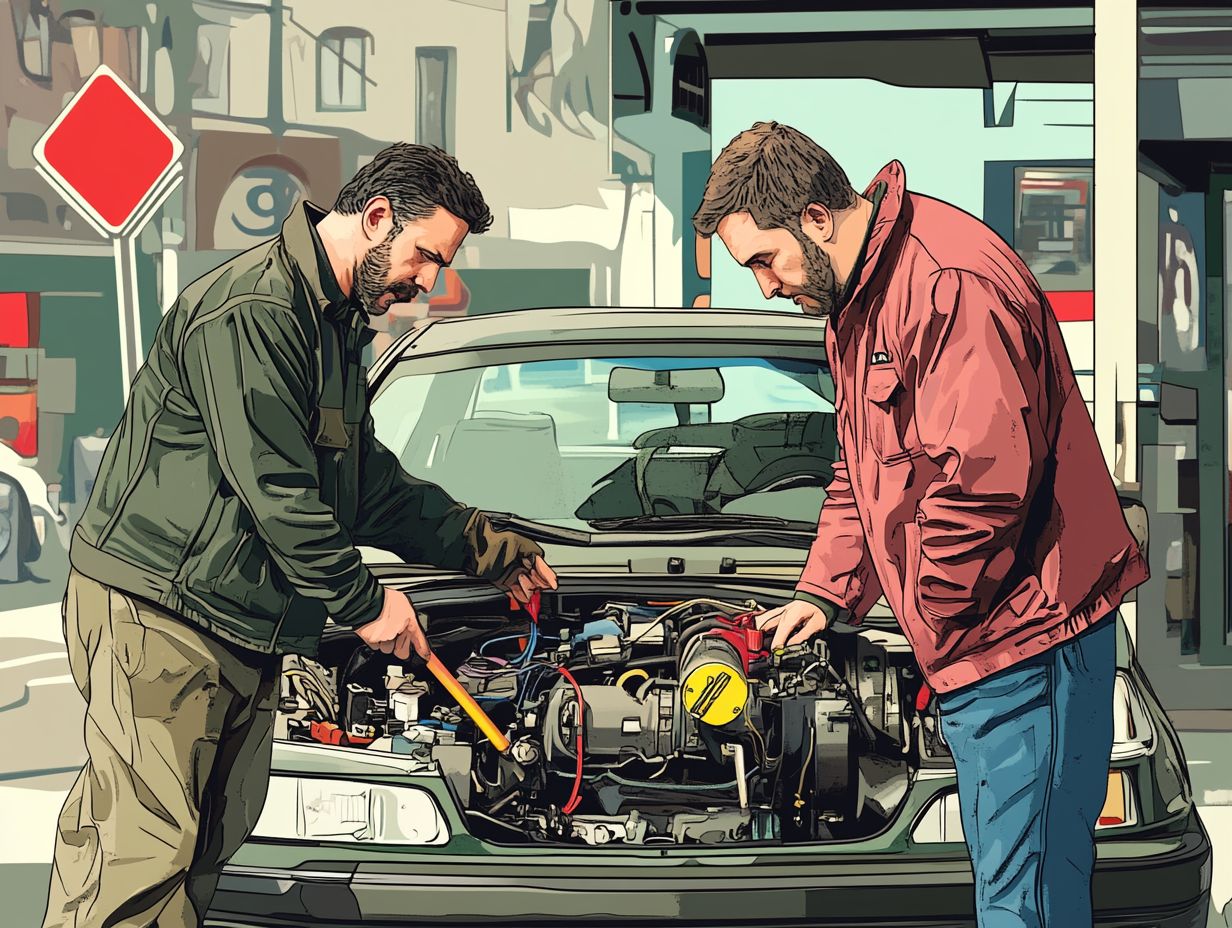
Several key factors warrant your attention when purchasing a used car, as these elements can significantly influence the vehicle’s reliability, performance, and overall value. To ensure a wise investment, consider following 5 tips for buying used cars with high mileage. Conducting thorough inspections, getting vehicle history reports, and reviewing maintenance records are critical steps that give you the power to make an informed purchase decision.
It s essential to grasp the implications of high mileage and potential title issues to ensure a positive buying experience. Researching available warranties can also bring you greater peace of mind, especially when unexpected repairs pop up.
It’s wise to assess not only the car’s physical condition but also its historical performance, including accident records and previous ownership. By diving into these factors, you can protect yourself from future inconveniences and financial pitfalls.
Compare the car s market value with similar models to give you an upper hand during negotiations, instilling a sense of confidence as you navigate the buying process.
How Can You Avoid Being Scammed When Buying a Used Car?
Avoiding scams when purchasing a used car demands your diligence, awareness, and a suite of precautionary measures. Knowing the 5 signs you found a good used car deal can help shield yourself from potential pitfalls.
Key strategies involve getting comprehensive vehicle history reports, performing careful checks, and remaining vigilant about unusually low prices or sellers hesitant to provide maintenance records. By equipping yourself with knowledge and performing due diligence, you can significantly mitigate the risks of falling prey to scams.
Check the seller s credibility this step can save you headaches later! Leverage reputable resources like Carfax or AutoCheck to unveil vital details about a vehicle’s past, including any accidents or title issues.
Never underestimate the importance of a test drive; this allows you to gauge the car’s condition firsthand. Additionally, a pre-purchase inspection by a trusted mechanic can reveal hidden issues that may not be immediately apparent.
Use these tips now to protect yourself and make a confident purchase!
What Are the Most Reliable Brands for Used Cars?
When you’re in the market for a used car, choosing a reliable brand can significantly boost your chances of enjoying a satisfying ownership experience. This often translates to fewer mechanical headaches and lower maintenance costs down the line.
Brands celebrated for their reliability typically shine in Consumer Reports, renowned for their durability and overall performance. Researching brand reputation offers invaluable insights for anyone looking to invest in a dependable vehicle.
You won t believe how reliable some brands are!
- Toyota and Honda consistently earn high praise for their longevity and fuel efficiency, making them top choices for those who appreciate practicality.
- Subaru stands out with its all-wheel-drive systems, especially appealing for those living in areas with harsh weather conditions.
By tapping into resources like Consumer Reports, you can access detailed insights on various makes and models. This helps you narrow down your options based on reliability scores and user satisfaction. These evaluations are crucial in steering you toward vehicles that meet your specific needs while promising a smoother, more reliable driving experience.
What Are the Most Common Red Flags to Look Out for When Buying a Used Car?
Recognizing common red flags when purchasing a used car is vital for steering clear of potential pitfalls. Familiarizing yourself with the top 5 warning signs during a car inspection can uncover deeper issues that may compromise the vehicle’s safety and reliability.
As you examine the vehicle’s exterior, keep an eye out for uneven panel gaps or fresh paint; these could indicate prior bodywork from an accident. Additionally, when you pop the hood, look for signs of rust or leaks, as these may signal neglected maintenance. For more guidance, consider these essential tips for buying used cars.
A thorough vehicle history report is essential. It provides an exhaustive account of past ownership, mileage discrepancies, and any reported accidents. Always consider taking the car to a trusted mechanic for a pre-purchase inspection; they can uncover hidden problems that might escape the untrained eye.
By staying vigilant and aware of these signs, you can make informed decisions and significantly reduce the likelihood of encountering unexpected repair costs down the line.
Preguntas Frecuentes

Cu les son las se ales de advertencia m s comunes al comprar un coche de segunda mano?
Las se ales de advertencia m s comunes incluyen:
- Alto kilometraje
- Se ales de accidentes anteriores o da os
- Registros de mantenimiento inconsistentes o faltantes
- Olores o ruidos extra os
- Modificaciones inusuales o desiguales
Por qu es una se al de advertencia el alto kilometraje al comprar un coche de segunda mano?
El alto kilometraje es una se al de advertencia porque indica que el coche ha sido conducido extensamente. Esto puede llevar a un mayor desgaste en los componentes del veh culo, lo que puede resultar en reparaciones costosas y una vida til m s corta.
C mo puedo saber si un coche ha estado en un accidente?
Algunas se ales de que un coche ha estado en un accidente incluyen:
- Dents visibles, ara azos o da os en la pintura
- Espacios de panel inconsistentes o partes del carro desalineadas
- Pintura de diferente color o sobrepintado
- Desgaste irregular de los neum ticos o ruedas desalineadas
- Un informe de historial del coche que muestre accidentes o da os anteriores.
Por qu es importante revisar los registros de mantenimiento de un coche de segunda mano?
Los registros de mantenimiento proporcionan informaci n valiosa sobre la historia del coche y pueden revelar problemas potenciales o se ales de advertencia. Tambi n pueden indicar qu tan bien ha sido cuidado el coche y si ha recibido mantenimiento regular, lo cual es crucial para la longevidad y el rendimiento de un coche de segunda mano.
Qu debo hacer si noto olores o ruidos extra os al probar un coche de segunda mano?
Si notas olores o ruidos inusuales durante una prueba de manejo, es vital que un mec nico los revise antes de comprar el coche. Estos podr an ser se ales de problemas subyacentes que podr an llevar a reparaciones costosas en el futuro.
Have you had experiences with buying used cars? Share your insights or questions below!
Por qu deber as estar alerta con modificaciones extra as en un coche usado?
Las modificaciones inusuales pueden ser una gran alarma. Pueden se alar que el coche ha sido tocado de una manera que pone en riesgo su rendimiento y tu seguridad.
No te la juegues. Inspecciona cada modificaci n y aseg rate de que un experto las revise antes de decidirte a comprar.



